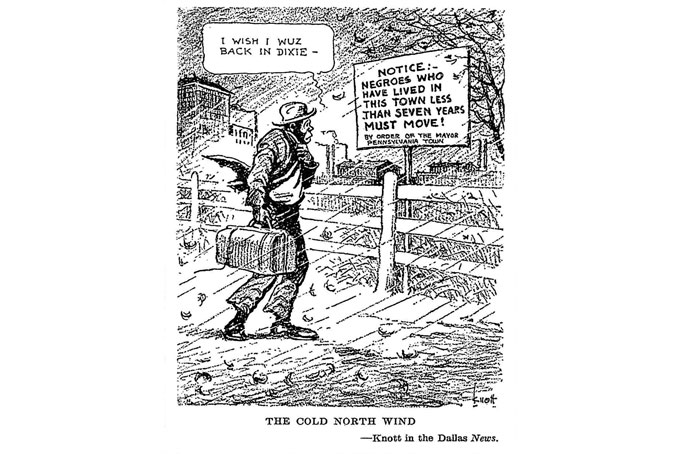
On Aug. 30, 1923, Johnstown Police Officer Joseph Grachen was deputed to the home of Robert Young in the city’s Black Rosedale neighborhood following calls of a domestic disturbance and left after being assured all was well.
Young, who was said to have a volatile temper, subsequently went out drinking with a friend and also searching for his wife—with whom he’d been arguing earlier—who was allegedly out with another man. Along the way he wrecked his car, and when Grachen responded to the accident, Young shot him.
He then fled to a nearby shed where he engaged in a pitched battle with police and county detectives. When the smoke cleared, Young and three officers were dead.
While the incident itself is tragic, it is not especially shocking to today’s audience—but what followed likely is: Johnstown Mayor Joseph Cauffiel ordered all the city’s Black residents who had lived there less than seven years to leave.
“I want every Negro who has lived here less than seven years to pack up his belongings and get out,” he told the Johnstown Democrat newspaper, adding. “For their own safety I am ordering all newly arrived Negro citizens of Johnstown to leave town.”
And before the governor and the NAACP could intervene, they did, along with a number of even newer Mexican residents. According to Richard Sherman’s 1963 treatise on the incident, estimates run from 500 to 2,000.
Now, writer Cody McDevitt, who published a series on the incident and its aftermath in the Somerset Daily American beginning late last year, is searching for the descendants of those who were exiled from Rosedale 93 years ago. And on Dec. 17 he will bring that search, and several exhibits, to the Homewood branch of the Carnegie Library.
“More than 2,000 people marched out of the city, penniless and scared. Most went west, according to my research. I’m trying to track down their descendants and the most obvious place to start would be Pittsburgh though they could have gone all over the country,” he told the New Pittsburgh Courier.
“I have attained all the documentation I could—including police reports, NAACP telegrams, council minutes and ACLU papers—along with hundreds of microfilm and database articles. I’ve visited the Library of Congress and the state archives in Harrisburg. The research has been going on for a year now, and I’ve reached the most important part—the oral histories.”
McDevitt plans to write a book, and donate the interviews to historical museums. He also plans to donate a portion of the book’s royalties to the NAACP Legal Defense Fund.
“I have a list of about 35 names of people who were forced out (See Box) that I compiled from official documents and newspaper accounts of the time. And I’d like to get the word out about the story so people can contact me if they were affected,” he said.
“But I’ve taken this as far as I can go without some help. If people are interested in becoming involved or want to share their ancestors’ story, they can come to the Homewood library, call me at 412-651-6882, or they can email me at codymcdevitt@gmail.com.
McDevitt will be at the Homewood library at 1:30 p.m., Dec. 17.
Like us at https://www.facebook.com/pages/New-Pittsburgh-Courier/143866755628836?ref=hl
Follow @NewPghCourier on Twitter https://twitter.com/NewPghCourier